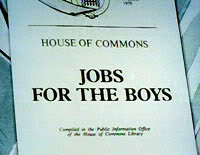 David Cameron vowed in opposition to rein in Britain's quango state in an attack on a bloated public sector.
David Cameron vowed in opposition to rein in Britain's quango state in an attack on a bloated public sector.
His threatened cull of taxpayer-funded organisations yesterday became reality for thousands of workers as the Health Secretary, Andrew Lansley, announced that half of the "arms-length bodies" run by his department were to be abolished.
The move to scrap such quangos as the Health Protection Agency provoked anger among nurses and doctors' organisations, which warned that public wellbeing would suffer as a result.
To date, the coalition Government has axed at least 80 quangos and warned many others that they faced mergers or deep cuts.
All of these will result in job losses across the country and could have huge impacts upon public health, welfare and culture.
ABOLISHED SO FAR
ARTS
*UK Film Council
*Museums, Libraries and Archives Council
*Advisory Council on Libraries
*Legal Deposit Advisory Panel
*Advisory Committee on Historic Wreck S ites
HEALTH
*Health Protection Agency (HPA)
*National Patient Safety Agency (NPSA)
*National Treatment Agency for Substance Misuse
*Alcohol Education and Research Council
*Appointments Commission (CQC)
*Human Fertilisation and Embryology Authority (by end of this Parliament)
*Human Tissue Authority
*Council for Healthcare Regulatory Excellence (to be made a self-funding body by charging a levy on regulators)
*NHS Institute for Innovation and Improvement
EDUCATION
*General Teaching Council
*Qualifications and Curriculum Development Agency
*British Educational Communications and Technology Agency (BECTA)
BUSINESS AND ECONOMY
*All eight regional Government Offices: South-West, South-East, East Midlands, West Midlands, East of England, North-West, Yorkshire & the Humber and North-East
*Eight out of the nine regional development agencies (the exception being London) and some of their local subsidiaries: Advantage West Midlands, East Midlands Development Agency, Yorkshire Forward, South-West Regional Development Agency, South-East England Development Agency, East of England Development Agency, North-West Regional Development Agency, One North-East
*Strategic Advisory Board for Intellectual Property policy (SABIP)
*SITPRO (Simplifying International Trade)
*Waste Electrical and Electronic Equipment Advisory Body (WAB)
*British Shipbuilders Corporation
*UfI/Learndirect
*Learning & Skills Improvement Service
*Institute for Learning *Standards and Verification UK
*IiP UK
*Hearing Aid Council
*Investors in People UK
HOME OFFICE
*National Policing Improvement Agency
ENVIRONMENT
*Sustainable Development Commission (funding withdrawn)
*Royal Commission on Environmental Pollution
*Agricultural Wages Board, the 15 Agricultural Wages Committees, the 16 Agricultural Dwelling House Advisory Committees and the Committee on Agricultural Valuation
*Inland Waterways Advisory Council
*The Commons Commissioners
*Infrastructure Planning Commission
*Commission for Rural Communities
MERGED ARTS AND SPORT
*UK Sport and Sport England
*National Lottery Commission with the Gambling Commission
UNDER THREATARTS
*Commission for Architecture and the Built Environment, English Heritage, Heritage Lottery Fund, National Heritage Memorial Fund – could be merged
*Advisory Committee on National Historic Ships (declassified, functions transferred to another body)
*Theatres Trust (declassified, so can act as an independent statutory advisory body)
*Churches Conservation Trust (could be declassified, pending talks with the Church of England) *Visit England and Visit Britain (status, role and functions will change)
*Design Council (under review)
BUSINESS
*Local Better Regulation Office
*ACAS (Advisory, Conciliation and Arbitration Service)
*Local Better Regulation Office
*Ofcom (in the short term it is losing its policy making power)
FOOD
*Food Standards Agency (its responsibilities have been much reduced)
ENVIRONMENT
*Carbon Trust (could be merged into new UK Green Investment Bank)
EDUCATION
*Partnership for Schools (school-building)
*Training and Development Agency (was facing the axe, but may now be spared)
SOCIETY
*Children's Commissioner for England – under review
*Equality and Human Rights Commission – has been accused of wastefulness by Home Secretary and faces further cuts
 George Osborne delivered a rebuke to the defence secretary, Liam Fox, when he declared that the costs of Britain's new Trident nuclear deterrent will come from the main defence budget.
George Osborne delivered a rebuke to the defence secretary, Liam Fox, when he declared that the costs of Britain's new Trident nuclear deterrent will come from the main defence budget.











